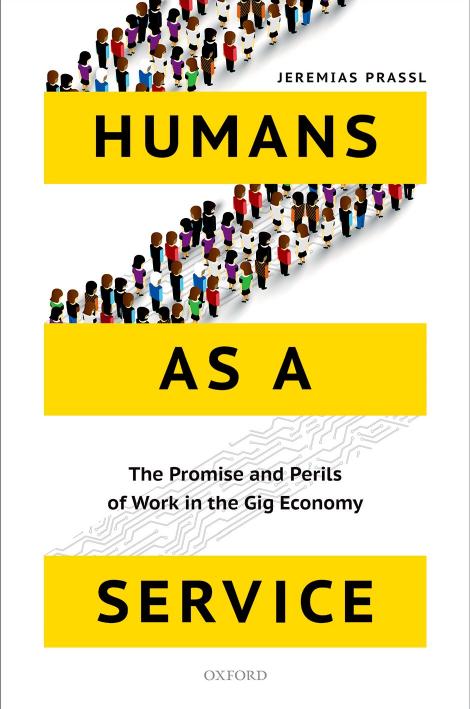Humans as a Service: The Promise and Perils of Work in the Gig Economy by Jeremias Prassl

Author:Jeremias Prassl
Language: eng
Format: epub, mobi, pdf
Published: 2018-02-15T11:09:39+00:00
* * *
104
Disrupting the Disruptors
In practice, this approach could lead to some difficulties. How can an
individual know where a worker is based or what the minimum wage is?
And how can we avoid both platforms and customers turning around and
blaming each other when an underpaid worker tries to assert her rights? As
regards minimum wage compliance, platforms easily have all relevant infor-
mation to hand: remember how Requesters on MTurk can already specify
the geographic origin of eligible Turkers. Under a functional concept of the
employer, the platform would be responsible for setting up its systems such
that, for any given amount of working time, no value below the relevant
proportion of an hourly minimum wage can be entered by the customer.27
The answer to potential enforcement problems similarly lies in recognizing
that platforms often stay involved in the exercise of employer functions,
their contractual assertions to the contrary notwithstanding. Under a legal
doctrine known as ‘joint and several liability’, a worker could therefore
choose to pursue either of her employers for the full sum owed, leaving the
joint defendants to settle proportions between themselves afterwards.
We will return to the broader economic and political case for ascribing
employer responsibilities to platforms, users, and even workers themselves in
the next chapter. For the time being, it is important to note that many
elements of the functional approach to identifying the employer, or even
multiple employers, have already been recognized in jurisdictions across the
world. The French courts, for example, have held ‘co-employers’ responsible
when several parties become closely involved in the exercise of key employer
functions,28 and the Court of Justice of the European Union has similarly
indicated its willingness to interpret the concept of the employer widely.29
In the United States, joint employer status has been part of the US Fair
Labor Standards Act since 1938;30 in the UK, the common law has similarly
evolved to hold multiple employers responsible.31
The question of employer responsibility in the on-demand economy is thus
considerably less intractable than it first appears. Mere contractual assertions are
never enough to deny workers’ proper classification as employees; a functional
concept of the employer can accurately and consistently assign responsibility
even where multiple parties exercise traditional employer functions. By includ-
ing on-demand workers who cannot enjoy the benefits of genuine entrepre-
neurship within the scope of employment law, a level playing field is restored:
platforms that provide services, rather than mere introductions between inde-
pendent contractors and their clients, are recognized as employers, with a duty
to pay and protect their on-demand workforce accordingly.
Download
Humans as a Service: The Promise and Perils of Work in the Gig Economy by Jeremias Prassl.mobi
Humans as a Service: The Promise and Perils of Work in the Gig Economy by Jeremias Prassl.pdf
This site does not store any files on its server. We only index and link to content provided by other sites. Please contact the content providers to delete copyright contents if any and email us, we'll remove relevant links or contents immediately.
| Air & Space | Construction |
| Disability | Educational Law & Legislation |
| Labor Law | Maritime |
| Military | Personal Injury |
| Sports |
Steroids: History, Science, and Issues by Standora Joan E.; Bogomolnik Alex; Slugocki Malgorzata(1195)
A Practical Guide to International Arbitration in London by Hilary Heilbron(1085)
Adrift by Steven Callahan(1033)
Reclaiming History by Vincent Bugliosi(1021)
Persuasion by Owner(1014)
The Nuremberg Interviews by Leon Goldensohn(991)
Dog Company: A True Story of American Soldiers Abandoned by Their High Command by Lynn Vincent & Roger Hill(980)
40 Days and 40 Nights by Matthew Chapman(969)
Poisoned by Jeff Benedict(960)
Last Narco by Beith Malcolm(936)
The New Whistleblower's Handbook by Stephen Kohn(921)
Introduction to the study and practice of law in a nutshell by Kenney F. Hegland(897)
Kafka's Last Trial by Benjamin Balint(849)
Lincoln's Code by John Fabian Witt(843)
A Passing Fury by A. T. Williams(826)
Japanese War Crimes during World War II: Atrocity and the Psychology of Collective Violence by Frank Jacob(812)
Eichmann in Jerusalem by Hannah Arendt(801)
Dog Company: A True Story of American Soldiers Abandoned by Their High Command by Roger Hill & Lynn Vincent(795)
A Court of Refuge by Ginger Lerner-Wren & Rebecca A. Eckland(786)
